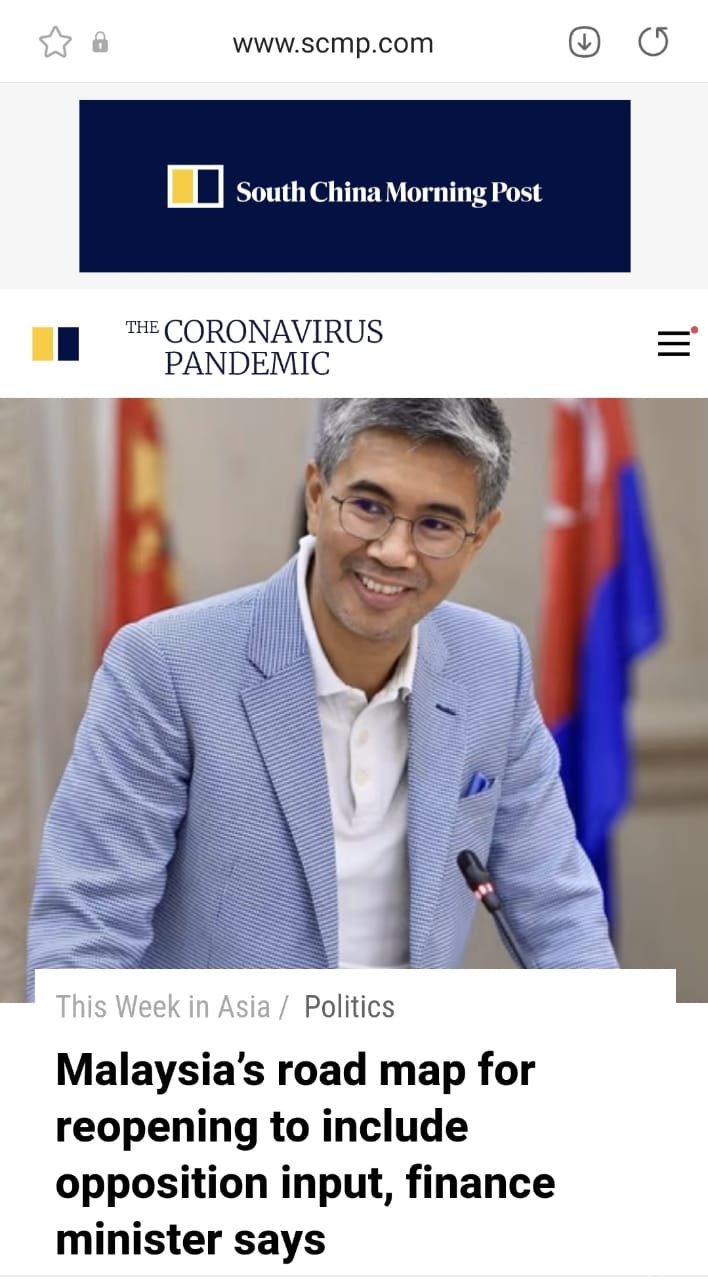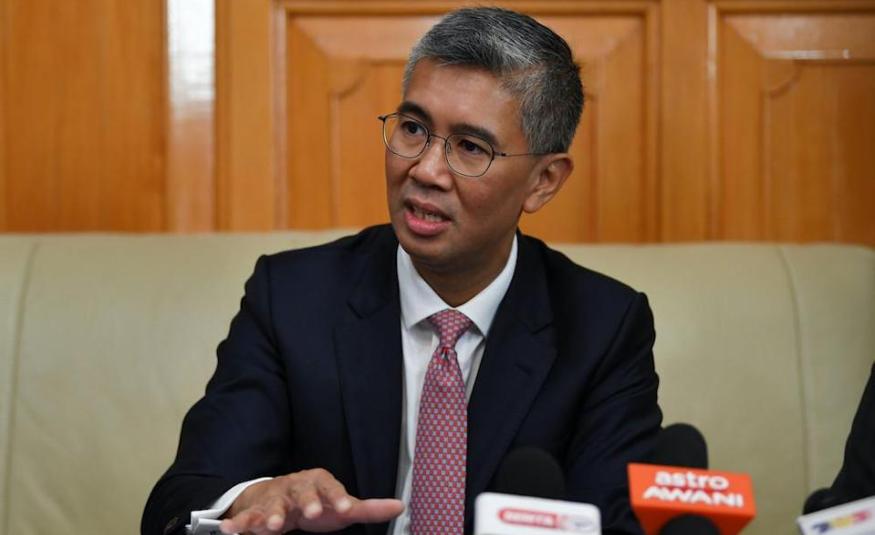Malaysia’s government, already under fire for its handling of the Covid-19 crisis, will cooperate more closely with the opposition as it implements a new road map for a progressive reopening of the economy, Finance Minister Tengku Zafrul Abdul Aziz said in an exclusive interview with South China Morning Post, published today.
Tengku Zafrul last week held rare talks with leading opposition figures such as ex-prime minister Mahathir Mohamad, former finance minister Lim Guan Eng and members of the influential Parti Keadilan Rakyat – all of whom are deeply at odds with current Prime Minister Muhyiddin Yassin.
“It’s important for people like me especially who are trying to draft and formulate this recovery plan that we listen,” Tengku Zafrul said in the Zoom interview on Friday.
The finance minister said he had also held talks with representatives of parties in his ruling Perikatan Nasional alliance, underscoring that lawmakers across the political spectrum were “front liners as they meet the people and they are the touch points”.
He added that the talks had been “very productive” and that he planned to host a second round of meetings this week to “try and understand some of the proposals”.
“I want to make data available to all because when they have data, they will get to give the right advice … meaning good feedback that is relevant and updated based on the current situation”.
Tengku Zafrul, a former top banker, was on July 9 tasked with coordinating the National Recovery Plan, a four-phase road map which envisages a full reopening of the economy after November once 60 per cent of the population is vaccinated and daily cases dip below 500.

Last week, the country recorded three straight days of record new infections, with 13,215 cases reported on Thursday before easing on Friday and the weekend. In total, more than 916,000 people have been infected and the death toll stands at 6,866.
Some 13.5 per cent of Malaysia’s 33 million people have so far been vaccinated and despite the current surge – taking place mainly in Selangor, the country’s wealthy industrial heartland – a rapidly increasing inoculation rate is giving hope that there is light at the end of the tunnel.
More than 400,000 jabs are now being administered per day, propelling the country to fourth in the world in Our World in Data’s tally of daily Covid-19 vaccines administered per 100 people.
Tengku Zafrul’s latest overtures to the opposition come as the ruling coalition faces increasing public criticism over a range of issues including gaffe-prone ministers and multiple lockdowns perceived as ineffective due to a lack of strict enforcement and clear guidelines.
To compound matters, Muhyiddin’s key coalition partner the United Malays National Organisation (Umno) has indicated it no longer backs him – though the party’s 32 MPs were given the autonomy to lend their support to the government in a personal capacity.
It is not known if Muhyiddin continues to have majority legislative support, as parliament has been suspended all year under an eight-month state of emergency that is set to expire on August 1.
The government had initially planned for a legislative sitting only after September – drawing claims from the opposition that it was afraid of being defeated by a no-confidence motion.
But following a public outcry about a lack of executive accountability and a rare intervention by the country’s constitutional monarch, Muhyiddin has agreed to allow a five-day parliament session starting on July 26.
We are facing a dual crisis, an economic crisis as well as a health crisis. What we don’t need is a political crisis
Tengku Zafrul said lawmakers would be able to ask questions about the National Recovery Plan during the truncated sitting.
On the government facing a trust deficit among the populace, he said “I think at the end of the day, it’s [about] how we execute the plans that we have”.
“[On vaccinations] we said we could go up to 200, 300, 400,000 [per day] in a matter of weeks and we have achieved that. But when we first announced that, obviously people were sceptical and you know people thought we couldn’t achieve it,” the minister said.
“So we need to prove that we can execute. So let’s see. I’m quite optimistic, although cautiously optimistic that we can achieve what we set out to do, especially in combating the pandemic.”
The minister sidestepped questions on dysfunction within the ruling alliance, saying instead that stability was important during the coronavirus crisis.
“If we look at where we are today, if you want me to be very honest, it is of course politically less than ideal,” Tengku Zafrul said, when asked if Muhyiddin had the backing of enough MPs to weather a no-confidence motion.
“I hope going forward, the political parties can work together … We are facing a dual crisis, an economic crisis as well as a health crisis. What we don’t need is a political crisis.”
In the 40-minute interview, Tengku Zafrul also addressed the flak the government has received over its response to the so-called Bendera Putih or White Flag campaign in the country.
Low-income families struggling to make ends meet have in recent weeks been encouraged to put up white flags outside their homes to indicate they needed help.
Civil society groups, political parties and even celebrities have pitched in to raise funds and distribute aid to such households.
But last week, Tengku Zafrul penned a commentary in Singapore’s Straits Times pushing back against assertions by a Bloomberg columnist that the white flag campaign was indicative of a country spiralling into a position as one of the world’s “also-rans”.
The finance minister’s sharply worded op-ed said “many social and political scientists are as baffled as I am by how a single community-care campaign (and perhaps also social media conversations) on helping those in need can be equated with impending failed statehood.”
Muhyiddin too has weighed in, saying that there was no need to raise white or black flags – which have been put up as a form of anti-government protest – as the government was already reaching out to people who needed aid.
“I think if we go to the ground we will probably find the kitchen of homes to be full [with supplies],” Muhyiddin said last Thursday, adding that though this was not the case for all those seeking help, a registration system was needed to ensure aid was distributed fairly.
Tengku Zafrul disagreed that the government was being flippant about low-income citizens’ plight.
“I don’t believe so … I accept that segments of society still need help. I think we have to be honest with ourselves. These are unprecedented times, and people are in very, very difficult situations,” he said.
“Many are doing their part to assist and I am very happy to see that as well. Personally of course, I am not a politician, and I don’t like for this to be politicised. I would rather go there and take action to support people who are left out.”
On unemployment, which stood at 4.5 per cent in May compared to 5.3 per cent in May last year, Tengku Zafrul said he expected the figure would rise as the impact of the current national lockdown is fully realised. Last May’s 5.3 per cent unemployment rate was the highest in three decades and was the result of the country’s first nationwide lockdown.
Nearly 300,000 new jobs have been created this year, putting the government on track to its goal of creating 500,000 new positions that can be billed by those who have lost their jobs and new graduates coming on stream, he said.
Tengku Zafrul said he had no intention to stand for elections when the pandemic abated.
The 48-year-old minister, previously CEO of CIMB Bank, was roped into his current role following Muhyiddin’s political coup over Mahathir’s government last March.
Tengku Zafrul is a member of Malaysia’s parliamentary upper house, the Dewan Negara, but is not a member of the prime minister’s Parti Pribumi Bersatu Malaysia.
The finance minister job “is like a national service to me …. My intention has always been to assist fellow Malaysians [and] I have no plan at this moment to enter politics”,” he said.
He added that his “conscience is clear” amid criticism over failing to provide adequate economic aid during the crisis. “I don’t think anyone knows what to do, really. There is no so-called precedence nor textbook I can refer to. So it’s important that we do our best … [and] we all together unite to win the war against Covid-19.” - DagangNews.com










